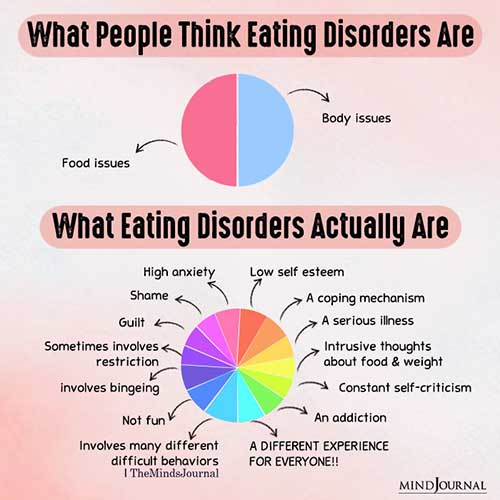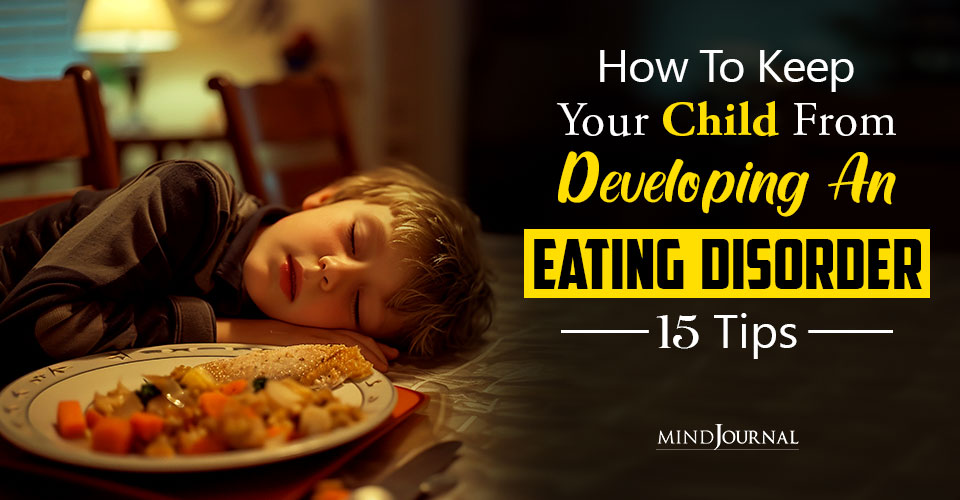Many of us, including our kids, struggle with unhealthy diets and lack of exercise. This worrying trend leads to children developing an eating disorder, leading experts to believe that our current generation may be less healthy than their parents. Let’s find out more about children and eating disorders.
In this culture, unfortunately, many of us eat diets that aren’t very healthy, and we don’t get enough exercise. That’s true for our kids, too. In fact, experts suggest that this is the first generation that’s less healthy than their parents.
Even worse, when you mix our cultural obsession with thinness with emotional immaturity and how disconnected we often are from our own bodies, it’s a perfect storm for eating disorders.
Guess how many kids growing up in the US today develop some kind of eating disorder? 12.5% of girls and 6% of boys. (See NEDA for stats.)
So eating disorders are a serious risk factor for our children. Luckily, parents have a lot more power than they realize to prevent eating disorders, but our intervention works best when it starts early.
Intervening in adolescence, when kids need to assert their right to control their own bodies, is more complicated and less effective.
What can you do to prevent your child from developing an eating disorder? Help your child develop a healthy body, a healthy emotional life, a healthy attitude toward food and exercise, AND a healthy body image.
Related: 6 Easy Ways To Start Loving Your Body, Right Now!
15 Ways To Keep Your Child From Developing An Eating Disorder
1. Consider your attitude toward your own body.
I hope you LOVE your body, every inch of it, no matter how it looks in the mirror. But most of us have been influenced by our culture’s obsession with thin, and we judge ourselves harshly.
So when we see our child starting to put on weight, all our self-judgment kicks in, and we project it onto our child, worrying that she’ll have a life-long struggle with her weight. Unfortunately, our kids pick up on our fear, and they assume something’s wrong with them.
So use this as an opportunity to develop a healthier relationship with your own body, so you don’t perpetuate that feeling of shame and “not good enough” onto another generation.
2. Educate your child about how the media presents thinness as equated with everything positive and perpetuates unrealistic images.
Point out that all the models on the magazine covers have been air-brushed; they simply aren’t real.
Terrific videos to show your daughter — and son! — are the Dove Evolution of Beauty Video (an ordinary young woman air-brushed into a billboard model) and Diet.com’s The PhotoShop Effect (showing how pervasive photoshop is, and how it has created an unrealistic standard of beauty against which we all judge ourselves.)
Discuss the fact that people with bodies that meet cultural standards of desirability are not any happier.

3. Commit yourself to model good eating and exercise habits.
Face it — Whatever you do, your child will do. If you enjoy being outside and moving your body, your child will want to join you. If you drink soda, they’ll drink soda. If you snack on that ever-present bowl of carrots, so will they.
If this seems to you like deprivation, consider that your bad habits are a sad legacy for your child. Aren’t you willing to change, to protect your child? Your increased health, vitality and good looks will reward you as much as your children asking for more carrots.
4. Don’t talk about dieting.
In fact, don’t diet, just eat healthfully, and make exercise an automatic part of life for everyone in the family. Research shows that dieting doesn’t work; it creates feelings of deprivation and longing that cause binge eating.
And it changes body chemistry so that not only do dieters almost always regain the weight, but losing it the next time is even harder. Only long-term healthy eating and exercising helps people lose weight and keep it off.
Want to teach your child self-control? Start with the idea of listening to your body: “Are you hungry for more?”
When your child wants sweets, instead of just saying no, which can build up feelings of deprivation, assure your child that sweets will be available another time: “The bakery is always here…we go there for special occasions, not every day.” Research shows this reduces longings and binges.
5. Learn the latest in nutrition.
The percentage of overweight Americans has more than doubled over the past century and has continued to rise, accompanied by similar rises in incidence of disease.
Culprits include our sedentary lifestyle, high stress levels, large food portions, and our evolutionary propensity to eat (and store) extra food in times of plenty just in case lean times are around the corner.
But nutritionists increasingly suspect that processed foods are the biggest contributor to our weight issues. Consumption of saturated fat has actually decreased during this period of extreme weight gain, while consumption of processed foods has increased dramatically.
Designed to last during long periods of storage and shipping, and with taste rather than nutrition in mind, foods with hydrogenated oils, preservatives, corn syrup and carbohydrates stripped of their nutrients are simply bad for our bodies.
They create chronic disease as we get older. But they start, even in childhood, by causing inflammation and cravings.
And, of course, most processed foods have added sugar. In fact, in the U.S., most adults get more than 10 percent of their daily calories from added sugar, which has negative effects on the entire body, including influencing hormones to make more fat than other carbs do.
Related: 30+ Truths About Diet Culture, Eating Disorders, And The Process of Healing
6. Don’t make your child self-conscious by commenting on it if you notice that he or she is getting heavier.
First, be aware that kids fill out before they shoot up. Second, consider whether your child is actually living a healthy lifestyle.
Does she get enough time running around outside in fresh air? Is he eating a healthy diet? If you decide some changes would be desirable, don’t single out your child.
Instead, ratchet up the physical activity level and healthy eating for the whole family. Changing food and activity habits is challenging for anyone, and to expect a child to give up treats that others in the house are eating is simply unreasonable.
7. Teach kids that treats are for special occasions, not for daily consumption.
Experts say that deprivation often leads to binging, which leads to guilt and a whole cycle of disordered behavior around food.
So instead of forbidding treats and junk food, teach your child that they can enjoy junk food and treats in moderation for special occasions.
That means you don’t need to keep junk food in the house, where it’s hard to resist. Kids will eat what’s around, and sneak it if they have to.
8. Keep trying to get them to eat their veggies.
No self respecting child tries a new food the first time she sees it. But eventually, she’s likely to.
That’s why kids who are exposed to more foods are more sophisticated eaters. Studies show that the major predictor in children’s willingness to eat a food is familiarity.
9. Get your child involved in sports.
Every child needs a regular physical activity. When girls get involved with sports, they have a healthier attitude toward their bodies for life. When kids find a sport they love when they’re younger, they’re much more likely to stay fit for life.
Instead of communicating that we exercise to tame body fat, explain that exercise keeps us healthier and happier in every way, by changing our body chemistry. Insist on family physical activity every weekend, and get moving with your child.
10. Never comment on other people’s bodies.
If you’re always saying how thin someone looks, or how fat, your child learns that body shape is what’s important, and she feels like people are always looking at HER body.
11. Discuss with sitters what your child may eat.
Being rigid will set up forbidden fruit, which will only sabotage your efforts, but an otherwise healthy diet can easily be overwhelmed by chips and soda every afternoon.
12. Nurse your baby
Nurse your baby to reduce his chances of being overweight as an adult.
Related: 3 Crucial Reasons Why Being A Role Model Parent Is Important For Your Child!
13. Reduce Stress and Increase Emotional Intelligence.
Kids who have higher levels of stress hormones in their bodies are less healthy physically, including the tendency to put on more weight.
Kids who have a hard time expressing emotions in words are more likely to eat to soothe upsets, and also are more vulnerable to eating disorders.
So consider if there are ways to decrease the stress level in your child’s life, and support your child to develop more emotional intelligence. (This whole website should help you with that!)
14. Reduce TV use.
Children who watch two hours of television each day are much more likely to grow into overweight adults with high cholesterol. It may be that advertising has as much to do with this correlation as inactivity.
US obesity specialist David Ludwig says recent research strengthens the case for a ban on food advertising aimed at children:
“In an era when childhood obesity has reached crisis proportions, the commercial food industry has no business telling toddlers to consume fast food, soft drinks and high-calorie low-quality snacks — all products linked to excessive weight gain.”
Did you know that in most countries, it’s illegal to market to kids, including with TV ads?
15. Accept your child exactly as she is.
Every child needs to be loved unconditionally. Never, in any way, communicate to your child that you think she would be prettier, more acceptable, or more lovable if she had a different body shape.
Related: 6 Unique Parenting Practices In Different Cultures To Learn From
Instead, clearly communicate that what matters is who we are inside and the choices we make about how we show up in the world.
Dr. Laura Markham is the founder of peacefulparenthappykids.com and author of Peaceful Parent, Happy Kids, Peaceful Parent, Happy Siblings and her latest book, the Peaceful Parent, Happy Kids Workbook.
Written By Dr. Laura Markham
Originally Appeared On Peaceful Parent Happy Kids










Leave a Reply